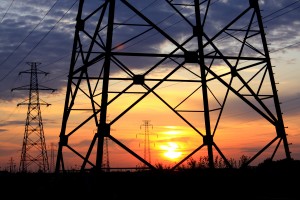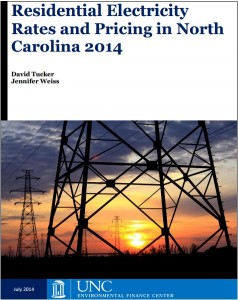Electricity rates and consumer electricity expenditures have wide ranging impacts on critical community and economic development issues in the state. New research from the Environmental Finance Center at UNC Chapel Hill demonstrates how variable pricing is across the state and the large number of factors that influence costs and pricing. Figuring out why one utility’s prices are higher than another can be difficult. However, in at least one region, there is general consensus about why prices are relatively high.
Last week big news hit the region: a $1.2 billion deal between the NC Eastern Municipal Power Agency (NCEMPA) and Duke Energy Progress could mean lower energy prices for many communities in the eastern part of the state.
Since 1982, NCEMPA has provided wholesale power to 32 cities and towns in eastern North Carolina, including some of the largest cities in the region. In many of these communities, electricity prices have historically been higher than regional averages due to a legacy agreement that gives NCEMPA partial ownership in several power generation plants. Along with this partial ownership comes a share of the cost of building and maintaining the plants, leaving NCEMPA with significant debt – which then gets passed on to customers in the form of higher rates.
Duke Energy has agreed to buy out NCEMPA’s interests in the plants, which could reduce NCEMPA’s debt by 70 percent – from $1.9 billion to about $480 million. Though the exact impact on rates for each community will vary, customers could see lower power bills as a result of a significant decrease in NCEMPA’s costs.
Although electricity prices in North Carolina are slightly lower than the US average, the affordability of electricity rates is always a concern. At a time when electricity is very much in the news, the EFC’s analysis of Residential Electricity Rates and Pricing in North Carolina summarizes the different residential electricity rates and pricing for all North Carolina utilities. In the wake of the recent agreement between Duke Energy and NCEMPA, the proposed U.S. EPA regulation of carbon emissions by power plants nationwide, coal ash spills in North Carolina (and the potential cost of clean-up and prevention of future spills), and the spread of solar power around the state, there has seldom been a time when electric power was more in the public eye.
The EFC’s report provides a comprehensive, comparative review of how utilities in North Carolina price electricity for residential customers. This report summarizes rates and rate structures from over 98% of residential electric utilities statewide and provides graphical analysis of rate setting practices. The report is accompanied by an interactive dashboard, a powerful tool that allows users to compare residential electric rates across the state at various consumption levels.
Learn More:
EFC Publications on NC Electricity Pricing
- Residential Electricity Rates and Pricing in North Carolina 2014
- 2014 North Carolina Electric Rates Dashboard
- Charging into the Question of Affordability: Residential Electric Rates in North Carolina from 2011 to 2013
- Watts Up with Cost Recovery for Municipal Residential Electric Utilities in NC?
News Articles on NCEMPA and Duke Energy Progress Agreement
- Duke Energy Progress to Purchase NCEMPA Generation Assets
- Duke Deal Could Lower Power Bills in Eastern NC Towns
- Fitch: US Public Power Deal Could be Positive for Constituents
- 1.2 Billion Deal Would Cut NCEMPA Debt 70 Percent to about $480 Million
Lexi Kay is the Marketing and Outreach Coordinator at the Environmental Finance Center at UNC Chapel Hill.





2 Responses to “What’s the Buzz about NC Electricity Rates?”
Kimmy I
My concern is with the city of albemarle utility company. I have been in my home seven years and from the first couple of months living here my bills have been outrageous. I called to have my meter reread and replaced several different times. I asked why have my bills been so high and was told that my bill was average and that was going off of the previous residents whom occupied the home. They base and average your bill according to the last person who stayed in the residence. Unbelievable and my bills have always been high even though I have only three people in the home. No matter what I have done my bills stay consistently high rather I’m home or not. I know I’ve been being overcharged and would like to have some information on who and what I can do to have this investigated.
Brad Gardner
Thanks for the informative post/blog on NCEMPA residential rates.
I think the big issue or “elephant in the room” so-to-speak is the routine/annual fund transfers a lot of these local member towns of NCEMPA do with the money they make off selling their own electricity.
Here in Elizabeth City they annually transfer $1 million+ dollars from the “electric fund” to the “city’s general operating fund”. On top of this the municipalities are exempt from any oversight of their rate structure by the NC Utilities Commission or other regulating bodies. Any co-op or private power provider must file petitions to raise/lower rates. So it is a free-for-all at the local level in determining what sort of individual municipality electric rate structure should be.
So despite I or neighbors making improvements in energy efficiency or conservation efforts we will always be paying substantially more. The Towns will tell you they make these fund transfers to keep the “property taxes” lower or help offset property taxes and that an individual residence can control their own “consumption” of electrical usage and save even more money.
I know as a resident and customer in Elizabeth City, NC the electricity rates I pay at my personal residence are always 40% higher than the neighboring power providers of Albemarle Electric and Dominion Power. (14.5 cents/kwh vs. 10.5-11 cents/kwh respectively) In turn it hurts the local towns in the long-run because word gets out in the community that you need to live “outside” of city-limits or in another power provider as to avoid NCEMPA/town power rates. This has become a common talking point for anyone living in E-City, realtors, developers or even in the military community since we have a lot of turn over in community with local Coast Guard families.
So in the end, I think it is still a wise idea to have NCEMPA divest itself of ownership shares in the power business but no guarantee it will leave individual towns/members to lower the power rates. This is due to the nice chunk of change the local towns make off controlling their own power rates to subsidize their town/municipal budgets. All of which is a bad addiction and only be overcome at the local level.
Sincerely, Brad Gardner